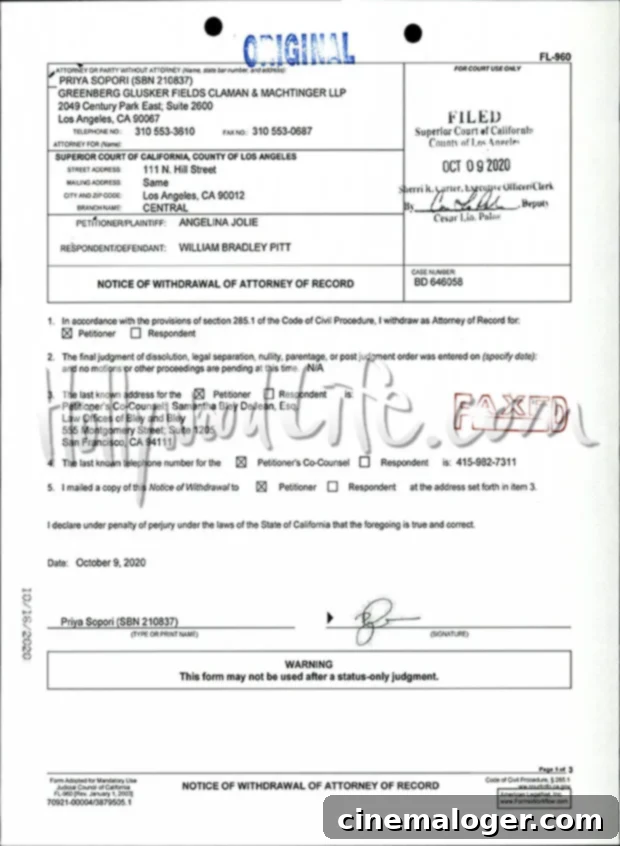Angelina Jolie & Brad Pitt Custody Battle: Expert Lawyers Analyze Attorney Priya Sopori’s Withdrawal
The highly publicized child custody battle between Hollywood titans Angelina Jolie and Brad Pitt has seen a recent development with the withdrawal of one of Jolie’s attorneys, Priya Sopori. This legal maneuver, documented in papers filed with a Los Angeles court on October 9, has sparked considerable speculation regarding its potential impact on the ongoing dispute, particularly concerning Pitt’s persistent request for a 50-50 custody split of their five minor children: Pax, 16, Zahara, 15, Shiloh, 14, and 12-year-old twins Knox and Vivienne. Sopori had been collaborating alongside Jolie’s primary attorney, Samantha Bley DeJean, and her departure has prompted two distinguished legal experts to offer differing interpretations of its significance for both parties involved in this high-stakes family court saga.
The Attorney’s Departure: A Closer Look at Priya Sopori’s Withdrawal
On October 9, attorney Priya Sopori formally filed a “Notice of Withdrawal of Attorney of Record” with the Los Angeles Superior Court. This document signaled her official departure from representing the Maleficent actress in one of the most scrutinized custody battles in recent memory. Sopori was part of a larger legal team, working in conjunction with Samantha Bley DeJean, who remains Angelina Jolie’s lead counsel. The immediate question arising from this development is whether it’s a routine legal adjustment, a strategic shift by Jolie’s camp, or an indication of underlying issues that could benefit one side over the other. The complexities of celebrity divorces, especially those involving children, often mean that every procedural step is magnified and intensely analyzed by legal commentators and the public alike, making such withdrawals a focal point of discussion regarding the future of the custody arrangements.
Expert Opinion: Is This Good News for Brad Pitt?
Renowned divorce attorney Raoul Felder of Stutman Stutman Lichtenstein & Felder unequivocally views Sopori’s withdrawal as a positive sign for Brad Pitt’s case. Felder, known for his incisive analysis of high-profile family law cases, believes that such a move by a reputable attorney is rarely benign. “It tells me if I were Mr. Pitt I’d be very happy based on these court documents because there are not many things worse than this that could happen. It’s basically saying that something bad is happening in the petitioners’ case,” Felder asserts. He suggests two primary reasons for such a withdrawal: either the client, in this instance Angelina Jolie, is “simply not following the lawyer’s advice,” or “there is some reason the lawyer just wants to get off the case.” Both scenarios, according to Felder, reflect unfavorably on the client initiating the withdrawal, potentially signaling instability or a breakdown in the crucial attorney-client relationship.

Felder further elaborates on the implications for Brad Pitt, stating, “So, I’d be very happy if I was Brad Pitt. He can say listen she couldn’t get along with her own lawyer, look at this. It is a very reputable firm and lawyers think very carefully before they say enough is enough and they want to get out.” This perspective highlights the professional gravity of an attorney choosing to withdraw from a case, especially one with such public scrutiny. He continues, “This lawyer has said ‘enough is enough and I want to get out.’ There’s no part of this that reflects well on Angelina.” For Felder, the decision by a respected legal professional to step away is a strong indicator of underlying discord or insurmountable difficulties in the client-attorney relationship, factors that could potentially weaken Jolie’s position in the ongoing custody dispute. The court, too, may view such a withdrawal as a sign of challenges within the client’s camp, which can subtly influence perceptions during complex legal proceedings.
The veteran divorce attorney emphasizes that such actions are not taken lightly within the legal profession. “It just sends out a completely negative message, that’s why lawyers don’t do it unless it becomes impossible. I suspect there must be more to the story. But we really can’t tell anything from this document except that the lawyer is saying, ‘Hey judge I want to get out and I don’t want to defend this woman anymore,'” Felder explains. He underscores the rarity of such an occurrence, adding, “Lawyers are not in the business of walking away from their clients, particularly a reputable firm like this, so there is a sub story here somewhere and it isn’t good for Angelina.” This suggests that the reasons behind Sopori’s withdrawal are likely significant and could potentially cast a shadow over Angelina Jolie’s legal strategy or conduct within the case. This type of development can be leveraged by the opposing side to suggest instability or lack of cooperation, which are not favorable attributes in a custody battle focusing on co-parenting and the children’s best interests, especially when a 50-50 custody split is on the table.

Delving deeper into the potential motivations for Sopori’s withdrawal, Raoul Felder posits that such situations “usually happens with very difficult people that don’t want to follow a lawyer’s instruction.” He highlights the ethical obligations of legal representation, stating, “Lawyers are in the business of representing people. You have a responsibility to continue until either the client discharges you or you work out a consent. But otherwise this is the last resort you have to submit this withdrawal to the judge.” He stresses that a formal withdrawal notice filed with the court, without client consent, represents a “last resort.” Considering the stature of Sopori’s firm, Felder finds it improbable that they would abandon a high-profile case unless compelling, unfavorable circumstances were at play. “This is a highly reputable firm, I can’t imagine why they would want to leave a case except for everything I imagine is not a helpful thing for Angelina,” he concludes, reinforcing his belief that this event carries negative implications for Jolie’s position in the custody battle and may provide Brad Pitt’s legal team with additional leverage.
Another Perspective: A Routine Procedural Step?
In stark contrast to Felder’s assessment, Los Angeles family lawyer Kelly Chang Rickert, who brings two decades of experience to her analysis, offers a different interpretation of Sopori’s departure. Rickert, known for her pragmatic approach to family law, suggests that the “Notice of Withdrawal of Attorney of Record” might either be an “incorrectly filed form” or simply a sign that Sopori’s specific scope of work on the case has reached its conclusion. “This form is usually filed after the judgment has been entered, and the attorney’s job is complete and done, so they can withdraw,” she explains to HollywoodLife.com. “This is a weird thing for them to file because the judgment has not been entered, and the document even says N/A. I think probably what happened is this firm was hired to consult on a limited scope basis and has finished their job. But it’s not really the proper form to file,” she states regarding the technical aspects of the withdrawal notice, suggesting a bureaucratic rather than a substantive issue.

Rickert maintains her position that the specific form utilized for the withdrawal is key to its interpretation. “It’s exclusively used when case is over and lawyer’s job is done. So it’s in my opinion, an improperly filed form and they probably consulted in a limited scope, and they should have filed a notice to withdraw after limited scope. They were co-counsel. but I still maintain it was the wrong form,” Kelly claims. This nuanced legal observation implies that while a departure has occurred, its implications might be procedural rather than indicative of a deep-seated problem within Jolie’s legal team or her conduct as a client. The distinction between a full withdrawal from a primary counsel role and the completion of a specific, limited task by a co-counsel is crucial in understanding the actual impact on the case. In essence, it could simply mean that Sopori’s specific project or area of expertise within the case has concluded, and her departure is merely the formal closing of that chapter, rather than a dramatic exit due to conflict.
According to Rickert, the form in question doesn’t necessarily provide insight into the overall trajectory of the case, nor does it inherently portray Angelina Jolie in a negative light. This is largely due to the fact that Jolie’s primary attorney, Samantha Bley DeJean, remains her representative. Rickert draws a clear distinction between Sopori’s withdrawal and Jolie’s previous separation from top divorce attorney Laura Wasser in 2018. “It doesn’t mean anything. Samantha Bley is still the primary counsel and she didn’t quit. I think Samantha hired this firm on a limited basis, maybe co-counsel on something, and either the work was done or maybe they weren’t paid. But it’s not as if her primary counsel is withdrawing. And with Laura Wasser, a substitution of attorney was filed,” Rickert clarifies. This earlier event involved a direct replacement of lead counsel, which carries far greater weight than a co-counsel’s withdrawal, especially if the latter was engaged for a specific, time-bound task. Thus, Rickert suggests that such a change is not comparable to a complete overhaul of the legal team, and its impact on the overall strategy for the 50-50 custody battle may be minimal.
The Enduring Battle for Custody of the Jolie-Pitt Children
The custody dispute over Pax, Zahara, Shiloh, Knox, and Vivienne has been a central and contentious aspect of the Jolie-Pitt divorce since their separation in 2016. Brad Pitt has consistently sought a 50-50 shared custody arrangement, emphasizing his desire for equal involvement in their children’s lives. Angelina Jolie, on the other hand, has reportedly sought a more limited arrangement, focusing on the children’s well-being and stability while navigating complex personal dynamics. This long-standing disagreement has led to numerous legal filings, court appearances, and a significant amount of media attention, making every development, like an attorney’s withdrawal, subject to intense public and legal scrutiny. The children, now ranging from early teens to late teens, are growing up amidst this highly public legal battle, which adds another layer of complexity to the proceedings and highlights the need for a definitive resolution that prioritizes their best interests.
Weighing the Interpretations: What Lies Ahead for the High-Profile Case?
The contrasting opinions of Raoul Felder and Kelly Chang Rickert underscore the ambiguities inherent in legal proceedings, especially when viewed from an external perspective. While Felder interprets Priya Sopori’s withdrawal as a significant setback for Angelina Jolie, possibly indicating deeper issues within her legal strategy or client-attorney relationship, Rickert sees it more as a technicality or the natural conclusion of a specific, limited engagement. What remains clear is that the Angelina Jolie and Brad Pitt custody battle continues to be one of Hollywood’s most closely watched legal dramas. Each legal filing, each statement, and indeed, each attorney change, contributes to the narrative and potentially shifts the dynamics of this high-stakes dispute. As the case progresses towards a resolution, the impact of this particular development will ultimately be determined by the court’s proceedings and the strategies employed by the remaining legal teams. For now, the legal world remains divided on whether this signals an advantage for Brad Pitt or merely a procedural footnote in a protracted and emotional family saga that continues to unfold in the public eye.
